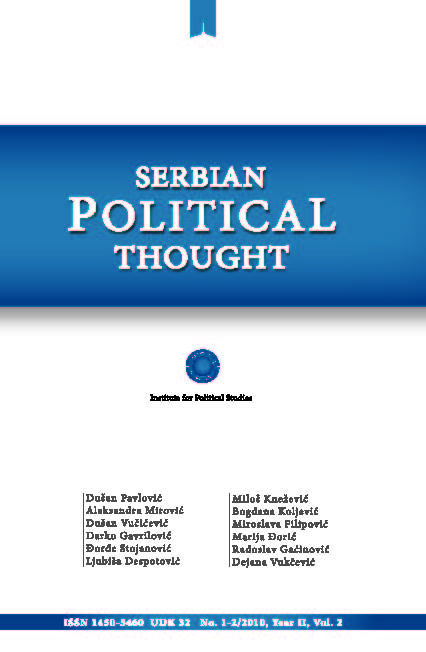Democratism and Elitism: Fragments on Elites, Democracy and Elitism
Democratism and Elitism: Fragments on Elites, Democracy and Elitism
Author(s): Miloš KneževićSubject(s): Politics / Political Sciences
Published by: Институт за политичке студије
Keywords: elites; elitisation; sociology of elites; mass; massification; massocracy; democratism; pan-democracy; democrature; neoliberalism
Summary/Abstract: The art of government almost always contains premises of competition and imposing and manipulation, and thus of politics as well. Negative and worth(less) type of elites and elitisation most often takes place in the area of direct politics. An aristocracy is a government of the minority of the best, whereas a democracy is a government of a majority, without substantial determination of its quality. In cases imbued with national elite and official, formal or state elite there are numerous congruencies in the common aspiration to establish a nation state in its democratic and European form. However paradoxical it may seem, neoliberal pro-democratism relies on the conceptual legacy of the left, first and foremost on its anarchist doctrine of the abolition of the state and the communist learning on dying of the state. Therefore, in the neoliberal grudge towards a strong state, some well-known components of anarcho-syndicalism, bolshevism, Leninism and Trotskyism can be distinguished. It is obvious that under counter indicated circumstances of pervading regressive and amoral political statuses of ochlocracy, kleptocracy, timocracy and mafiocracy, Serbian society in decline has great difficulty with its own elites. In correspondence between political theory and political practice of a society in transition, especially Serbian society in “passing” and “change”, there is an apparent gap between proclaimed ideals and non-idealized reality. Power is mostly won and obtained by those who do not gain it by means of their virtues, but by resourcefulness and skill. Democrators govern as pro-democrats, in the name and on behalf of ideals of democracy. Manipulated and “democratized” transitional mass, in the sad role of the loser of the transition, has replaced the oppressed working class that had disappeared from the political and economic scene in the vortex of deindustrialization and deagrarianisation of Serbia. The working class and middle class have actually merged into governable and impoverished transitional mass. During the process of massification subjects of transition have been turned into passive and depersonalized objects of the reforming “transition”. Many of those who wanted to pass into welfare have, in reality, been skillfully tricked!
Journal: Serbian Political Thought
- Issue Year: 2/2010
- Issue No: 1-2
- Page Range: 99-112
- Page Count: 14
- Language: English

